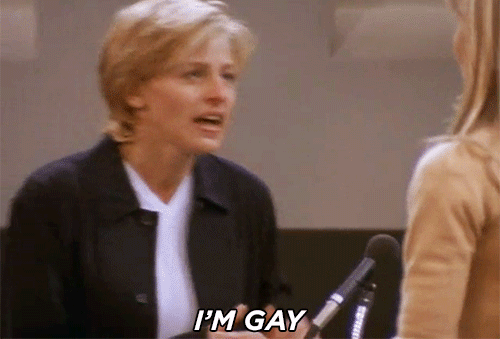The Puppy Episode
Throughout the history of Hollywood, the main characters of television shows were predominantly straight, white men. Only on occasion would a woman carry the show on her shoulders. However one thing was almost always true: the main character would be straight and the majority, (if not all), other characters would either have no reference to their sexuality or be assumed as straight. Most shows lacked both gender and race representation but no one was brave enough to go against the status quo.
Nowadays, shows are more likely to have an LGBTQ identifying character in some capacity. The show that helped Hollywood make that leap was Ellen, starring - a not-yet-out-of-the-closet - Ellen DeGeneres. Ellen used her show to come out, both as her character, and in real life. ‘The Puppy Episode’ is known to be the spark of LGBTQ representation on screen. She knew there would be backlash but she didn’t care.
Throughout the series, Ellen’s character went on many dates and had boyfriends. It wasn’t until the 22nd episode of the fourth season that we properly discovered the character’s sexual orientation. It’s called ‘The Puppy Episode’ because Ellen and her friends figured that if she didn’t want physical companionship with a person, she should get a puppy. In the episode, Ellen’s therapist (played by Oprah Winfrey) asks her if she’s ever been in love with anyone. Ellen replies, “Susan.”
After this episode, Ellen continued for one more season and was then cancelled due to the conflict around having a gay character as the lead. Additionally, the actress that played Susan, Laura Dern, took heat for her role in the episode. There was pressure from the American Family Association to drop the storyline and many advertisers decided to cancel their ads for the remainder of the series.
Despite the initial negativity, this episode started something immense for TV and film. ‘The Puppy Episode’ turned out to be the highest rated episode of the series, won a Primetime Emmy Award for Outstanding Writing for a Comedy Series and another for Outstanding Multi-Camera Picture Editing. In 1998, Ellen DeGeneres won a GLAAD Media Award and was ranked #46 on TV Guide's ‘100 Most Influential Episodes of All-Time’. She appeared on the legendary cover of TIME with the caption, “Yep, I’m Gay.” Not only was her character coming out, Ellen was revealing her true self to the whole world. The character of Ellen Morgan coming out has been described as the most influential gay moment in television. This event helped to ease LGBT characters into the media and encouraged acceptance for LGBT identifying people in general. It paved the way for shows like The L Word, Will and Grace, Ugly Betty, and My So-Called Life.
After Obama awarded Ellen the ‘Medal of Freedom’ in 2016, he acknowledged “just how important it was not just to the LGBT community, but for all of us to see somebody so full of kindness and light, somebody we liked so much, somebody who could be our neighbor or our colleague or our sister challenge our own assumptions, remind us that we have more in common than we realize, push our country in the direction of justice.” Although Ellen DeGeneres has had some controversy surrounding her in the news and on social media lately, her impact on the LGBTQ culture is undeniable.
Ellen Morgan coming out was a huge stride in LGBT representation on the screen. Without this monumental event, we wouldn’t have many of the beloved characters we see on TV and in movies today. Although there is still a long way to go, that moment in 1997 sparked a change. There’s even a website called afterellen.com that is dedicated to LGBTQ news around the world.
‘The Puppy Episode’ changed the portrayal of LGBTQ characters in TV and film. It showed that it’s possible to talk about serious and seemingly controversial topics in a humorous, entertaining way. Ellen Morgan stating she’s gay in the PA system of the airport was the catalyst to a revolution in representation of different sexual orientations. Thank you to Ellen and everyone who worked on the show for taking the risk and changing TV forever.
